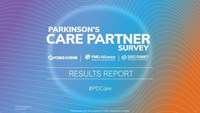Kyowa Kirin, Davis Phinney Foundation and PMD Alliance publish findings from 2022 Parkinson's Care Partner Survey and accompanying whitepaper
Care partner role growing as condition impacts more people — 10 million people worldwide, nearly one million in the U.S. alone1
BEDMINSTER, N.J., Nov. 3, 2022 /PRNewswire/ -- Kyowa Kirin, Inc., an affiliate of Kyowa Kirin Co., Ltd. (Kyowa Kirin, TSE: 4151), a global specialty pharmaceutical company, today announced the publication of Burden and Benefit: Embracing the duality of the Parkinson's caregiving experience, a whitepaper that explores the caregiving experience, featuring insights from the 2022 Parkinson's Care Partner Survey and advice from advocates and care partners on how to plan for the road ahead. The survey and whitepaper were developed in partnership with the Davis Phinney Foundation and Parkinson & Movement Disorder (PMD) Alliance, with input from members of the PD community. In honor of National Family Caregivers Month, the survey results report and whitepaper are now available at http://bit.ly/3T1jMtk.
"Findings from the survey show the impact Parkinson's can have on a person cast in the role of care partner, a role many feel ill-prepared for. Yet despite the challenges they face, many still find it an extremely rewarding experience," said Susan Thiele, Senior Director, Communications & Advocacy, Kyowa Kirin North America. "Our whitepaper delves into this duality further to provide a greater understanding of care partner needs and insights to help them plan for the care of their loved ones without compromising their own health and well-being."
The survey and whitepaper are the latest outputs from the partnership which is committed to initiatives that shed light on the impact of Parkinson's disease and programs aimed at supporting those affected by PD. This effort builds on earlier research conducted in 2020 that deepened our understanding of PD care partner needs, leading to new education and support programs from the advocacy community.
Survey reinforces the critical role of care partners in supporting healthcare needs and beyond; highlights emotional impact of caregiving
Among 2022 Parkinson's Care Partner Survey respondents (n=752), the average care partner was approximately 65 years of age, was a spouse or significant other, and spent more than 46 hours a week providing care. The vast majority (93%) of respondents said their primary responsibility was providing emotional support, with 73% saying their biggest challenge was watching their loved one's symptoms worsen.
Care partners also reported being a central part of their loved one's healthcare team — both inside and outside of medical appointments. They were often the first to see changes in Parkinson's symptoms (88%), to observe subtle differences in their loved one's personality and behavior (based on open-ended survey responses), or to notice "OFF" episodes — when symptoms return as medication wears off (76%). They saw tracking and communicating these updates to the medical team as an important part of their role.
"This research confirmed what we see every day in the Parkinson's community — that care partners play an essential role and work tirelessly to support the health and well-being of their loved ones," said Melani Dizon, Director of Education, Davis Phinney Foundation. "It was important to shed light on the multi-faceted role that a care partner plays, the impact on their own emotional and physical health, and the support they need along the caregiving journey."
Learn more about the survey findings (http://bit.ly/3DD1I3o)
Because Parkinson's disease is a progressive, neurodegenerative disease, the skills and knowledge required by a care partner evolves over time. And while the patient usually receives information and guidance about the journey ahead, less attention is often focused on educating and supporting care partners.
The whitepaper provides a closer look into the role of caregiving – both the struggles and the rewards – drawing directly from the survey findings and real-life experiences. Care partners face challenges from navigating relationship dynamics to managing mounting household tasks to playing a critical role in medical care. The impact of these responsibilities is substantial, with care partners citing negative effects on their own emotional (81%), mental (76%) and physical health (61%).
"Care partners may face dark moments as they deal with a heavy load of responsibilities while watching their loved one grapple with Parkinson's disease, but many do find bright spots along the way," said Anissa Mitchell, LCSW, Chief Program Officer of PMD Alliance. "Our hope is to empower care partners to establish a strong partnership with their loved one and have a positive mindset as they work to tackle Parkinson's disease, together."
The whitepaper provides guidance from members of the PD and care partner community, including the importance of engaging the patient as an active partner, being proactive and prepared, managing increasing responsibilities, and prioritizing the care partner's own health and well-being. The white paper also provides links to existing care partner resources created by the PD community.
Learn more about the whitepaper: http://bit.ly/3zDF2yD
A total of 752 U.S. care partners of patients with Parkinson's disease responded to the survey, which was conducted using online and computer-assisted telephone interviewing (CATI) during a four-week period in February and March 2022. All respondents identified themselves as the primary nonprofessional care partners of a loved one diagnosed with Parkinson's disease. While 82% were spouses or significant others, 10% were children of patients.
The Davis Phinney Foundation was founded by Olympic cyclist Davis Phinney in 2004 to help people with Parkinson's live well today. The organization's focus is to provide programs, early-stage research, and resources that offer inspiration, information, and tools that enable people living with Parkinson's to take action to immediately improve their quality of life. Parkinson's is the second most common neurodegenerative disease – second to Alzheimer's – and affects more than one million people in the United States. The Foundation's work impacts hundreds of thousands of individuals and families each year.
Parkinson & Movement Disorder (PMD) Alliance is an independent, national 501(c)3 nonprofit on a mission to empower people impacted by movement disorders with the tools and meaningful connections they need to thrive today. PMD Alliance provides free resources to the entire Movement Disorder Care & Support Ecosystem©—to people living with the disease, care partners and adult children, support group leaders, and healthcare providers—because we all do better when everyone's empowered. PMD Alliance believes in expanding access to high quality, expert-driven, deep-diving online and in-person programs. PMD Alliance is here to navigate the waves of a movement disorder together, bringing clarity and life-giving solutions. PMD Alliance is not affiliated with any medical practice or institution.
Kyowa Kirin strives to create and deliver novel medicines with life-changing value. As a Japan-based global specialty pharmaceutical company with a more than 70-year heritage, the company applies cutting-edge science, including expertise in antibody research and engineering, to address the needs of patients across multiple therapeutic areas such as nephrology, oncology, immunology/allergy and neurology. Across its four regions – Japan, Asia Pacific, North America and EMEA/International – Kyowa Kirin focuses on its purpose, to make people smile, and is united by its shared values of commitment to life, teamwork, innovation and integrity.
Learn more about the Company at www.kyowakirin.com.
Reference
1 Parkinson's Foundation. Statistics. https://www.parkinson.org/understanding-parkinsons/statistics
SOURCE Kyowa Kirin


